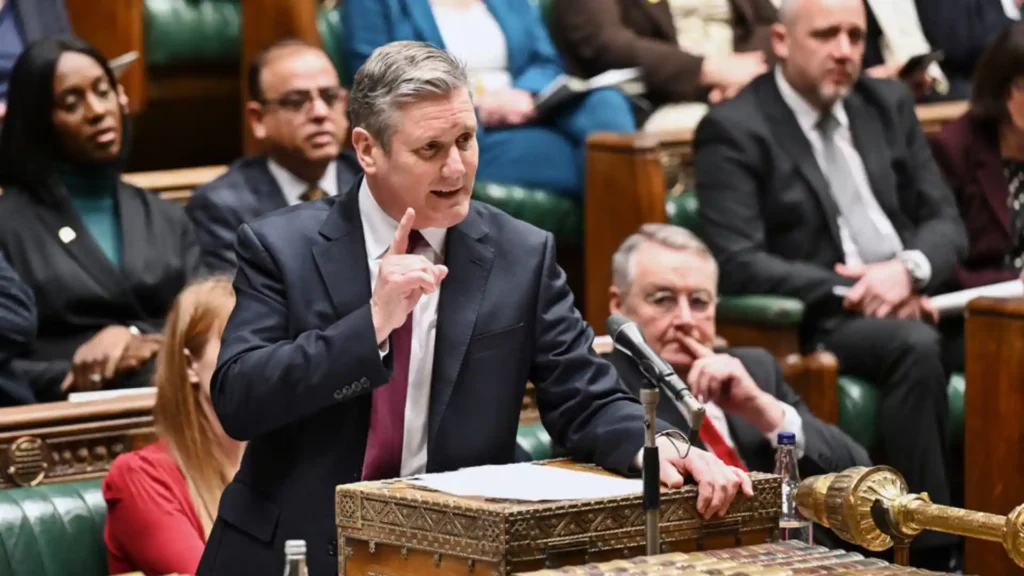Labour was predicted to secure 410 seats in the 650-seat Parliament, according to the highly accurate exit poll supported by Britain’s biggest broadcasters
Based on the exit poll, Keir Starmer and his revived Labour Party won a landslide election on Thursday in Britain, ushering in a new government dominated by the left. The Conservative Party had ruled the country for 14 years.
Voters expressed their dissatisfaction with the current Tories and their readiness to take a chance on a “changed Labour Party,” as Starmer refers to it, stripped of its socialist rhetoric and hard-left components.
Labour was predicted to secure 410 seats in the 650-seat Parliament, according to the highly accurate exit poll supported by Britain‘s biggest broadcasters. The Conservatives were predicted to win 131 seats, which would be the lowest number for the party since its establishment.
Based on the model, the Liberal Democrats secured the third position with 61 seats. The success of Nigel Farage’s new right-wing Reform UK party was one of the surprises. The official results are arriving, most of which will be released in the British early hours of the morning.
There has been a change in Britain’s leading parties with the fall of the Conservative government and the rise of the Labour Party. Starmer announced that he had kept his parliamentary seat and declared that it was time to put a stop to “the politics of performance” and “return to politics as public service.” Today’s Labor leaders present themselves as reasonable managers rather than socialist zealots.
Starmer, a former editor of a Trotskyite magazine, has pledged to make “wealth creation” the focal point of everything the new administration undertakes in an effort to jolt the economy out of slumber, assist young families in purchasing cheap homes, and support the cherished but overly expansive National Health Service.
It will be necessary for Starmer and his group to uphold the treasure with sobriety, as they have promised. The public coffers are full. The amount of public debt has increased to the greatest extent since the 1960s. A lot of people think taxes will go up.
Starmer ran on a platform of “change,” but his platform was incredibly ambiguous. Though not adored, he is liked. His fans will be relieved when he walks into Downing Street, albeit perhaps not overjoyed.
As an attorney, Starmer was renowned for assembling his cases piece by piece, first as a human rights advocate and later as a senior government prosecutor. He is an attention-to-detail person.
Voters specifically demand greater public services, mortgage rates that are lowered, and incomes that exceed inflation.
In contrast to his predecessor, hard-left Jeremy Corbyn, Starmer has shown caution while making a number of unfulfilled promises. Labour was advertising the competent management of marginally better days to come this election, not a super fantastic future.
Although Prime Minister Rishi Sunak didn’t have to call for an election before the end of the year, he chose to take a chance in the hopes that the polls would close or that he wouldn’t be consumed by party dissidents.
For the Conservatives, election night was dismal.
The past 18 months have been calmer for Sunak. However, many report to pollsters that they have lost faith in Conservatives to manage the economy. That had long been a pillar of the party platform.
Labour leader Wes Streeting claimed on the BBC that the Conservative party was swept away because “it’s a clown car.”
Reform UK, Farage’s right-wing populist party, was predicted to gain 13 seats, a significant increase over earlier polls.
Tony Travers, a politics professor at the London School of Economics, stated that the far-right tendency in Britain is “more muted or less easy to see” than in France, or in a different way in the US.
Many believe that a government led by Labour will aim to forge deeper ties with the EU. However, Starmer said, “No,” in response to a question from reporters asking if he could imagine a scenario in which Britain would return to the single market or customs union during his lifetime.
On paper, Labour and Conservative differences are minimal when it comes to Britain’s foreign policy and its unique relationship with the United States.
Starmer won’t make any significant moves. He will remain unwavering in his support of NATO and his efforts to arm and assist Ukraine. He might exert further pressure for a peace agreement on the Israel-Gaza conflict.
